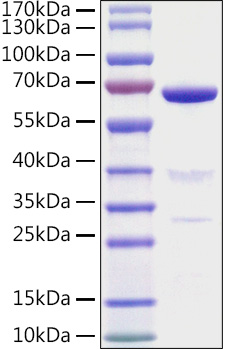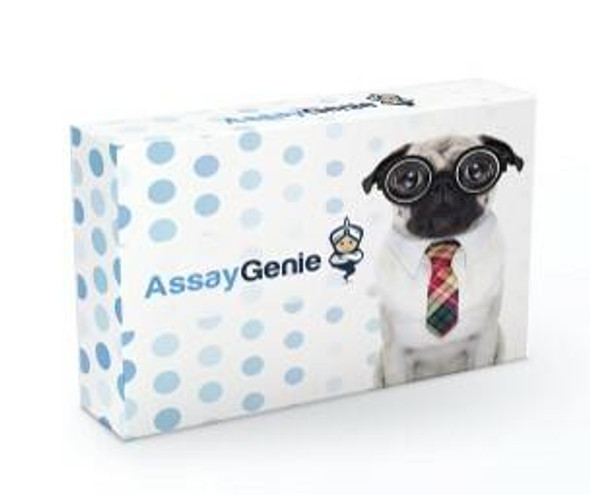Description
Recombinant Human MIS/AMH Protein
The Recombinant Human MIS/AMH Protein is a biologically active recombinant protein that plays a significant role in various cellular processes and signaling pathways in human biology. This protein is widely employed in immunological research, cell biology studies, protein-protein interaction analyses, and therapeutic development, providing researchers with a reliable tool for investigating MIS/AMH function and its implications in health and disease.
This product (SKU: RPCB1977) is produced using HEK293 Cells and features a N-His tag for convenient detection and purification. The protein exhibits a calculated molecular weight of 59.1 kDa with an observed molecular weight of 63, 40, 35 kDa under denaturing conditions, achieving ≥ 90 % as determined by SDS-PAGE., ensuring exceptional quality and consistency for research applications.
Key Features
| High Purity by Affinity Chromatography | |
| Mammalian & Bacterial Expression Systems | |
| High lot-to-lot consistency via strict QC |
| Product Name: | Recombinant Human MIS/AMH Protein |
| SKU: | RPCB1977 |
| Size: | 50 μg |
| Reactivity: | Human |
| Synonyms: | MIF, MIS |
| Tag: | N-His |
| Expression Host: | HEK293 Cells |
| Calculated MW: | 59.1 kDa |
| Observed MW: | 63, 40, 35 kDa |
| Gene ID: | 268 |
| Protein Description: | High quality, high purity and low endotoxin recombinant Recombinant Human MIS/AMH Protein (RPCB1977), tested reactivity in HEK293 Cells and has been validated in SDS-PAGE.100% guaranteed. |
| Endotoxin: | < 1 EU/μg of the protein by LAL method. |
| Purity: | ≥ 90 % as determined by SDS-PAGE. |
| Formulation: | Lyophilized from a 0.22 μm filtered solution of 20 mM Tris, 150 mM NaCl, pH 8.0. |
| Reconstitution: | Centrifuge the vial before opening. Reconstitute to a concentration of 0.1-0.5 mg/mL in sterile distilled water. Avoid vortex or vigorously pipetting the protein. For long term storage, it is recommended to add a carrier protein or stablizer (e.g. 0.1% BSA, 5% HSA, 10% FBS or 5% Trehalose), and aliquot the reconstituted protein solution to minimize free-thaw cycles. |
| Storage: | Store at -20℃.Store the lyophilized protein at -20℃ to -80 ℃ up to 1 year from the date of receipt. After reconstitution, the protein solution is stable at -20℃ for 3 months, at 2-8℃ for up to 1 week. |
Anti-Mullerian hormone (AMH), a member of the TGF-beta superfamily, is produced by granulosa cells (GCs) of preantral and small antral follicles and plays a role in regulating the recruitment of primordial follicles and the FSH-dependent development of follicles. BMP15 up-regulates the transcription of AMH and that the inhibition of p38 MAPK decreases the BMP15-induced expression of AMH and SOX9, suggesting that BMP15 up-regulates the expression of AMH via the p38 MAPK signaling pathway, and this process involves the SOX9 transcription factor. AMH is widely used for assessing ovarian reserve, and it is particularly convenient, because it is thought to have minimal variability throughout the menstrual cycle. Fetal anti-Mullerian hormone (AMH) is responsible for normal male sexual differentiation, and circulating AMH is used as a marker of testicular tissue in newborns with disorders of sex development. Anti-Mullerian hormone (AMH) produced in the developing testis induces the regression of the Mullerian duct, which develops into the oviducts, uterus and upper vagina. As well as other hormone receptors, and a decreased ovarian cortex cell proliferation. These results help understand the inhibitory effects of AMH on follicular development.







